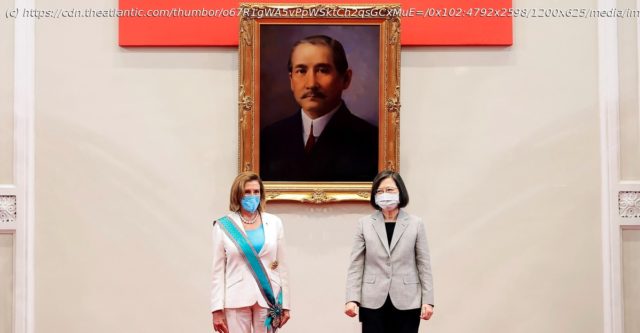Taipei is celebrating; Beijing is seething. This may prove a consequential moment in a looming confrontation between China and the U.S. over not just the island’s future but the world’s.
On the surface, Nancy Pelosi’s trip to Taiwan looks like an American triumph. The House speaker flew into the island’s capital yesterday, undeterred by China’s threats and the announcement of military exercises in the surrounding seas. As she met with Taiwan’s president, Tsai Ing-wen, and spoke to its legislature, the Chinese leader Xi Jinping had to watch helplessly, able to do no more than order his forces to splash about in nearby waters in a display of rage and futility.
This narrative has elements of truth, but things aren’t that simple. Pelosi’s trip is likely to be the beginning, not the end, of a crisis in U.S.-China relations. Beijing could stretch out its response for weeks, even months, with unforeseeable consequences. Only hours before Pelosi’s arrival, China’s foreign ministry warned that the U.S. would “pay the price” for the affront. The real impact of Pelosi’s visit may not be clear for years.
Pelosi’s Taiwan gamble has reinforced trends in the U.S.-China relationship that are edging both countries toward conflict in East Asia. Ever more ambitious, Beijing believes that China has a right to be the paramount power in the region and that the U.S. is standing in its way. In Washington, D.C., policy makers see America’s future as depending on Asia and are resolved to maintain, or even expand, its system of alliances in the region to entrench U.S. influence and contain China’s.
Taiwan sits directly on the fault line between these two competing powers and their agendas. To the U.S., Taiwan is not merely a longtime friend, but also a crucial economic partner and a link in the network of democracies that upholds American power in the Pacific. To China, Taiwan is an indispensable component of the country’s ascent to superpower stature. Claiming Taiwan has been a top priority for the Chinese Communist Party ever since it chased its Nationalist foes off the mainland to the island at the end of the civil war in 1949. To this day, Beijing considers Taiwan an errant province that remains an integral part of China.
Pelosi’s trip to Taiwan intensified the insecurity among China’s leaders about achieving that goal. They already fear that the government in Taipei is drifting ever further into the American orbit, making “peaceful reunification,” as they call it, less and less likely. The Pelosi visit exposed the limits of Beijing’s power over the island—especially with the U.S backing up Taiwan—and the risks that that poses to the Communist regime. In Beijing’s perception, Pelosi’s visit offers legitimacy to Taiwan’s democratic government. And if all of Beijing’s bluster and threats couldn’t scare away even an octogenarian from California, what’s to stop a parade of foreign dignitaries from visiting Taiwan in defiance of China? The outcome, China’s leaders fear, could be Taiwan declaring formal independence—a step they could never tolerate.






